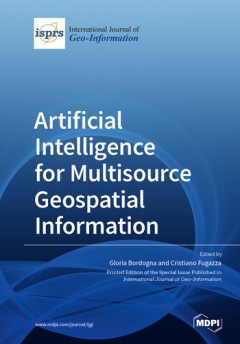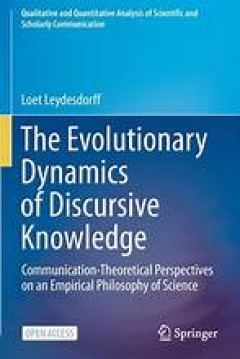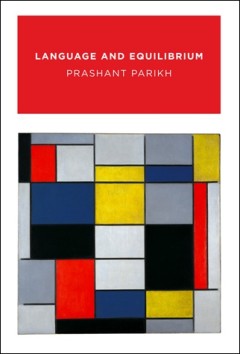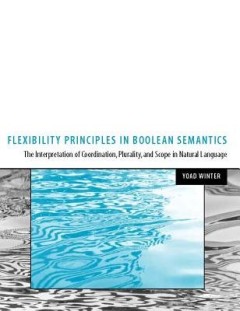Filter by

Artificial Intelligence for Multisource Geospatial Information
This reprint collects 10 original research contributions published in the Special Issue entitled “Artificial Intelligence for Multisource Geospatial Information” of the ISPRS International Journal of Geo-Information. The focus is on different methods of Geospatial Artificial Intelligence (GeoAI) based on deep learning using different network architectures, clustering, soft computing, and se…
- Edition
- -
- ISBN/ISSN
- 9783036563879
- Collation
- -
- Series Title
- -
- Call Number
- -

Artificial Intelligence for Multisource Geospatial Information
This reprint collects 10 original research contributions published in the Special Issue entitled “Artificial Intelligence for Multisource Geospatial Information” of the ISPRS International Journal of Geo-Information. The focus is on different methods of Geospatial Artificial Intelligence (GeoAI) based on deep learning using different network architectures, clustering, soft computing, and se…
- Edition
- -
- ISBN/ISSN
- 9783036563879
- Collation
- -
- Series Title
- -
- Call Number
- -

A Gender-based Approach to Parliamentary Discourse : The Andalusian Parliament
Does gender condition politicians' discourse strategies in parliament? This is the question we try to answer in A Gender-based Approach to Parliamentary Discourse: The Andalusian Parliament. This book, written by experts in the field of discourse analysis, covers key aspects of political discourse such as gender, identity and verbal and nonverbal strategies: intensification, enumerative series,…
- Edition
- -
- ISBN/ISSN
- 978 90 272 6633 0
- Collation
- 219 hlm
- Series Title
- -
- Call Number
- -

The Evolutionary Dynamics of Discursive Knowledge
This open access book addresses three themes which have been central to Leydesdorff's research: (1) the dynamics of science, technology, and innovation; (2) the scientometric operationalization of these concept; and (3) the elaboration in terms of a Triple Helix of university-industry-government relations. In this study, I discuss the relations among these themes. Using Luhmann's social-systems…
- Edition
- 1
- ISBN/ISSN
- 978-3-030-59951-5
- Collation
- -
- Series Title
- Qualitative and Quantitative Analysis of Scientific and Scholarly Communication
- Call Number
- X, 247

Counterspeech: multidisciplinary perspectives on countering dangerous speech
- Edition
- -
- ISBN/ISSN
- 9781003377078
- Collation
- -
- Series Title
- -
- Call Number
- -
- Edition
- -
- ISBN/ISSN
- 9781003377078
- Collation
- -
- Series Title
- -
- Call Number
- -

Language and Equilibrium
In this work, Prashant Parikh offers a new account of meaning for natural language. He argues that equilibrium, or balance among multiple interacting forces, is a key attribute of language and meaning and shows how to derive the meaning of an utterance from first principles by modelling it as a system of interdependent games.OCLC-licensed vendor bibliographic record.
- Edition
- -
- ISBN/ISSN
- 9780262281263
- Collation
- 1 online resource (xii, 344 pages) :illustrations
- Series Title
- -
- Call Number
- -
The generative lexicon
The Generative Lexicon presents a novel and exciting theory of lexical semantics that addresses the problem of the "multiplicity of word meaning"; that is, how we are able to give an infinite number of senses to words with finite means. The first formally elaborated theory of a generative approach to word meaning, it lays the foundation for an implemented computational treatment of word meaning…
- Edition
- -
- ISBN/ISSN
- 9780262281966
- Collation
- 1 online resource (xii, 298 pages).
- Series Title
- -
- Call Number
- 400 PUS g

Word and Object
A new edition of Quine's most important work.Willard Van Orman Quine begins this influential work by declaring, "Language is a social art. In acquiring it we have to depend entirely on intersubjectively available cues as to what to say and when." As Patricia Smith Churchland notes in her foreword to this new edition, with Word and Object Quine challenged the tradition of conceptual analysis as …
- Edition
- New ed.
- ISBN/ISSN
- 9780262312790
- Collation
- 1 online resource (xxx, 277 pages)
- Series Title
- -
- Call Number
- -

Subjunctive Conditionals: A Linguistic Analysis
Ippolito proposes a compositional semantics for subjunctive (or would) conditionals in English that accounts for their felicity conditions and the constraints on the satisfaction of their presuppositions by capitalizing on the occurrence of past tense morphology in both antecedent and consequent clauses.OCLC-licensed vendor bibliographic record.
- Edition
- -
- ISBN/ISSN
- 9781461943273
- Collation
- 1 online resource (xii, 159 pages).
- Series Title
- -
- Call Number
- -

Flexibility Principles in Boolean Semantics: The Interpretation of Coordinati…
An investigation of the logical flexibility principles needed for a formal semantic account of coordination, plurality, and scope in natural language.Since the early work of Montague, Boolean semantics and its subfield of generalized quantifier theory have become the model-theoretic foundation for the study of meaning in natural languages. This book uses this framework to develop a new semantic…
- Edition
- -
- ISBN/ISSN
- 9780262286374
- Collation
- 1 online resource (x, 297 pages) :illustrations.
- Series Title
- -
- Call Number
- -
 Computer Science, Information & General Works
Computer Science, Information & General Works  Philosophy & Psychology
Philosophy & Psychology  Religion
Religion  Social Sciences
Social Sciences  Language
Language  Pure Science
Pure Science  Applied Sciences
Applied Sciences  Art & Recreation
Art & Recreation  Literature
Literature  History & Geography
History & Geography